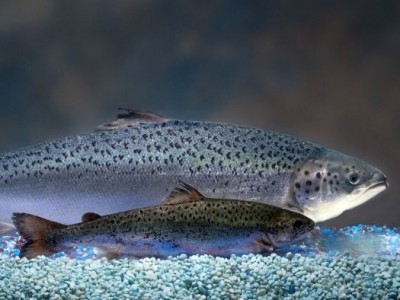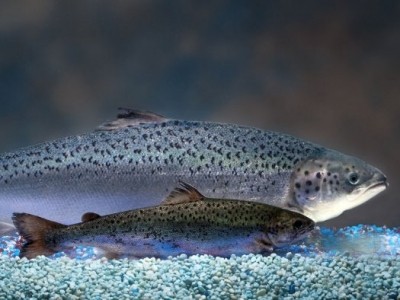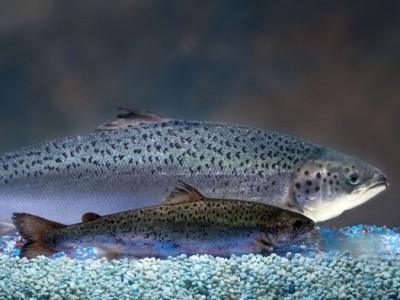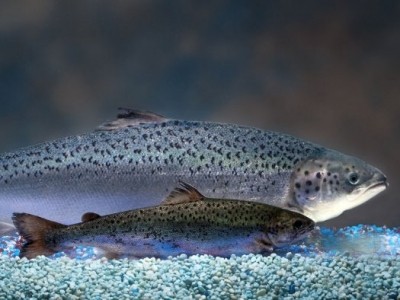GE salmon a step closer to commercialization as Environment Canada says AquaBounty's AquAdvantage Salmon are not harmful to the environment or human health
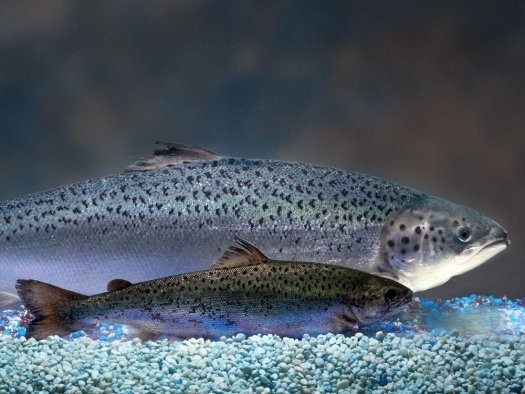
The agency’s Significant New Activity Notice (click here) was published following a risk assessment by Fisheries and Oceans Canada, which convened a panel of independent experts in transgenics and fish containment technology.
It also involved “a rigorous examination of our hatchery facility [in Prince Edward Island, Canada, which produces sterile, all-female eggs] and the Standard Operating Procedures used to produce AquAdvantage Salmon eggs”, said AquaBounty, which has been stuck in limbo for years as regulators mull over the GE fish, which include a gene from the faster-growing Pacific Chinook salmon enabling them to reach maturity twice as quickly as standard Atlantic salmon.
A land-based and environmentally-sustainable production system
The notice follows an announcement from the US Food & Drug Administration, which said last year that the fish “would not have a significant impact on the US environment” (click here).
However, for the eggs and fish to be approved for sale in the US and Canada, AquaBounty still needs final regulatory approvals from the US Food and Drug Administration and Health Canada, said CEO Dr Ron Stotish.
“When these approvals are in place, we look forward to demonstrating the value of AquAdvantage Salmon for a land-based and environmentally-sustainable production system."
AquaBounty has willing buyers for its eggs
AquaBounty produces GE salmon eggs in Canada. The plan is to ship them to FDA-approved facilities to grow into fish.
So far, the only growing facility is a small one operated by AquaBounty in Panama. However, if the FDA gives the technology the green light, several partners are poised to set up facilities in other locations in which to grow the fish, each of which would require FDA approval on a case-by-case basis, Dr Stotish told FoodNavigator-USA.
While Trader Joe’s, Whole Foods Market, Aldi, and some other retailers say they will not sell GE seafood, even if the FDA gives it the seal of approval, AquaBounty has willing buyers for its eggs, he added.
“We keep hearing from groups that are violently opposed to the technology that no one wants it, but we don’t believe that consumers in general are opposed and we have quite a number of people interested [in buying the eggs and raising the GE salmon in approved facilities].
“We don’t want to name them publicly because we don’t want them to be targeted by activist groups; we’ve become very concerned about their tactics.”
Meanwhile, opponents of the technology continue to promulgate claims “they know to be untrue”, he said. “Their worst fear is that there will be a market for the fish.”
Claims that AquaBounty lacks relevant permits at Panama facility are ‘nonsense’, says CEO

Meanwhile, recent allegations from environmental group Centro de Incidencia Ambiental de Panama (CIAM) that AquaBounty’s facility in Panama lacks required permits, including a waste-water discharge permit, were “nonsense”, he said.
“We are in full compliance with all of the requirements of the Panamanian government to operate this facility”, added Dr Stotish, who says arguments that the GE salmon could present serious health risks and decimate wild salmon populations, are "not supported by the facts".
However, George Kimbrell, senior attorney for the Center for Food Safety, said: “These allegations suggest a dangerous pattern of non-compliance and mismanagement by AquaBounty, raising the likelihood of an environmentally damaging escape of these fish.
“If and when FDA finally approves GE salmon and new production facilities open up around the world, we expect this scenario to play out again and again.”
What happens if the fish escape?
In a recent article in the Food & Drug Law Institute’s Food and Drug Policy Forum, biotech experts Dr Alison L. Van Eenennaam, Dr William M. Muir, and Dr Eric M. Hallerman argued that should the GE salmon escape from enclosed FDA-regulated facilities, selection over time would be expected to purge the transgene from any established salmon population.
"Based on the data, the long-term risk of GE salmon [multiplying in the wild] is close to zero as no fitness advantages in any component were demonstrated, resulting in a purge scenario for the transgene."
They added: “No Atlantic salmon has ever successfully mated with any of the Pacific salmon species and so fears that sterile, female Atlantic salmon housed in a contained facility in the highlands of Panama will escape, migrate to the ocean, and then traverse thousands of miles across tropical seas and interbreed with wild Alaskan Pacific salmon are scientifically unfounded.”
Sustainability argument for GE salmon
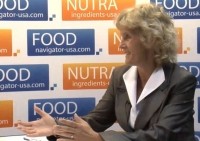
They also argued that wild-caught fish deplete oceanic stocks and do not present a long-term, ecologically sustainable solution to rising global fish demand.
“A recent study found that transgenic AquAdvantage salmon had better feed conversion ratios, higher nitrogen retention efficiency, and achieved target weight gain in a considerably shorter period (40%) than conventional Atlantic salmon fed the same experimental grower diet in freshwater until they tripled their weight.
“Total feed required to produce the same fish biomass was reduced by 25% in the transgenic fish; representative of a significant and economically-relevant reduction in overall feed intake which is by far the most significant cost associated with salmon aquaculture.”
Food & Water Watch: AquaBounty’s sterilization process is imperfect
However, Tim Schwab, senior researcher at anti-GM lobby group Food & Water Watch, said AquaBounty’s sterilization process is "imperfect", adding that the FDA noted that "up to 5% of GE salmon could be fertile, which could amount to many thousands or even millions of fertile fish [potentially escaping and breeding with wild fish] once commercial production begins.”
Meanwhile, containment measures at AquaBounty’s facility in Panama “appear insufficient to withstand the region’s frequent extreme weather and severe flooding”, he claimed.
Click here to read some arguments for and against the technology.
Click here to read a letter of support signed by CBAN, Friends of the Earth, Food and Water Watch, Center for Food Safety, Food and Water Europe and GeneWatch UK in support of an administrative claim filed in Panama about AquaBounty's facility there.
